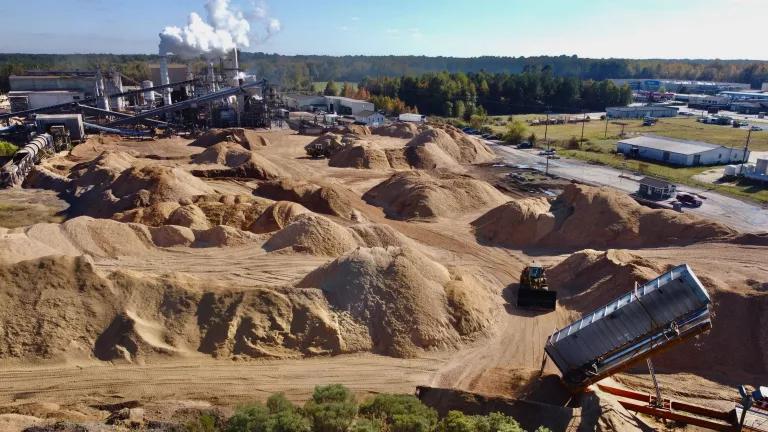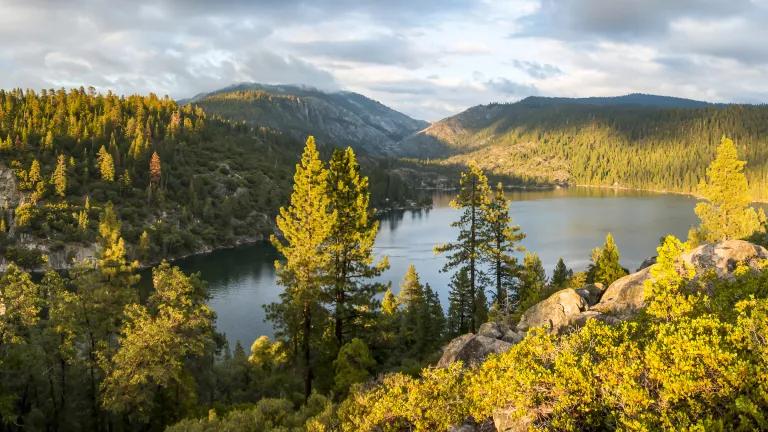
Boreal forest
California policymakers have breathed new life into the lungs of the earth, taking a major step toward protecting the world’s climate-critical forests. In a landmark vote on Wednesday, the California Assembly passed a groundbreaking bill that would ensure the state’s procurement contracts protect boreal and tropical forests and fundamental Indigenous rights. With the passage of the California Deforestation-Free Procurement Act (Assembly Bill 416) authored by Assemblymember Ash Kalra, the Assembly has moved the state closer toward embracing a bold and essential framework for safeguarding the world’s most indispensable natural allies in the fight against climate change.
AB 416, which is co-sponsored by NRDC, Friends of the Earth, Social Compassion in Legislation, and Peace 4 Animals requires that contractors supplying forest products to the state have policies to prevent boreal and tropical deforestation and intact forests loss and guarantee Indigenous Peoples the right to free, prior and informed consent (FPIC) for any operations on their traditional territories. The bill, which is supported by more than 74 U.S. environmental organizations and sustainable businesses, investors representing $1.6 trillion in assets, and leading Canadian environmental organizations, recognizes that forestalling the worst impacts of climate change means ending not just our addiction to fossil fuels, but also the continued destruction of the forests that stand between us and climate catastrophe.
The bill embraces a global vision of forest protection, giving long overdue attention to the unsustainable loss of intact boreal forests, in addition to deforestation in the tropics. The boreal, which crowns the Northern hemisphere in a carbon-dense landscape of spruce, larch, and birch, is a vital ally in the fight against climate change. Per acre, it holds twice as much carbon as tropical forests, and in Canada alone, where the most intact boreal forest remains, contains twice as much carbon as the world’s oil reserves. Yet, industry has been quietly driving this crucial forest toward a breaking point, pushing at-risk species to the brink and releasing the boreal’s vast stores of carbon into the atmosphere.
While tropical countries have drawn global outrage for deforestation, Northern countries have benefitted from an international regime that largely overlooks their degradation of intact, carbon-dense forests and prioritization of industry interests over globally recognized Indigenous rights. The first- and third-highest intact forest loss in the world is happening in Russia and Canada, respectively—both predominantly boreal regions, while the highest tree losses per capita are in Sweden, Norway, Canada, and Russia. In Canada, despite the country’s vaunted environmental reputation, only 15 of 51 boreal caribou herds have sufficient habitat to survive long-term, logging companies aren’t being held accountable for their climate impacts, and Indigenous Peoples are not guaranteed the right to determine the future of their traditional territories.
AB 416 marks an end to Northern countries’ impunity, holding boreal supply chains to the same standards as tropical forests. This scrutiny, however, also offers a new opportunity for Northern countries to achieve recognition for embracing fundamental climate and Indigenous rights standards in their forests. With climate scientists around the world calling for the protection of the world’s remaining intact forests and growing marketplace pressure to protect both boreal and tropical forests, AB 416 sets up a framework for governments and industry to finally embrace greater supply chain rigor and clarity and ensure Indigenous Peoples’ globally recognized rights to dictate the future of their territories.
Out of all the countries with tropical and boreal forests that would be covered under the bill, the most vocal opposition has come from the logging industry in Canada. AB 416’s success in the Assembly came despite fierce opposition from the Forest Products Association of Canada (FPAC), an industry trade group that’s used misinformation tactics to undermine environmental safeguards. Relying on mischaracterizations of the bill and greenwashing of current industry requirements, FPAC has simultaneously tried to insist on Canadian forestry’s sustainability while deploring the bill’s impact on its logging industry. FPAC’s attempts to have it both ways create Gordian knot of incompatible talking points--if FPAC’s practices are truly world-class and aligned with Indigenous rights standards, AB 416 would actually benefit Canadian industry by holding all countries to the same baseline requirements.
FPAC has also successfully roped the Canadian government into its precarious stance. In a stunning reversal from recent commitments on natural climate solutions, Canada has followed FPAC’s lead in opposing the bill, raising questions about the country’s true commitment to natural climate solutions. Quebec, Ontario, and Alberta have also attacked the bill, defending their "world-class" forestry practices even as they continue to roll back environmental protections. Far from alleviating public scrutiny of its logging practices, this position shines a spotlight on Canada's own backyard and exposes the tensions between the country's claims of leadership on natural climate solutions and its allegiance to actors working against aligning the logging industry with a climate-safe, equitable future.
AB 416’s passage through the Assembly is a wakeup call for policymakers and companies around the world that climate leadership depends not just on decarbonization, but also on protecting the world’s greatest natural climate allies. Global leaders must remedy broken supply chains that convert irreplaceable intact forests into toilet paper and subordinate Indigenous rights to demand for shampoo. And ultimately, they must recognize the global nature of the crisis in our forests, from the tropics to the boreal, and, like California’s Assembly, meet it with transformative, bold solutions.




